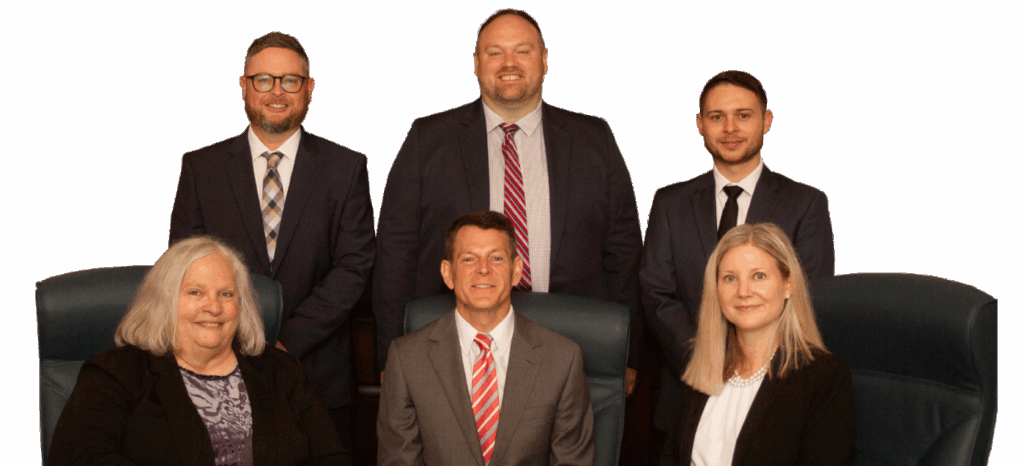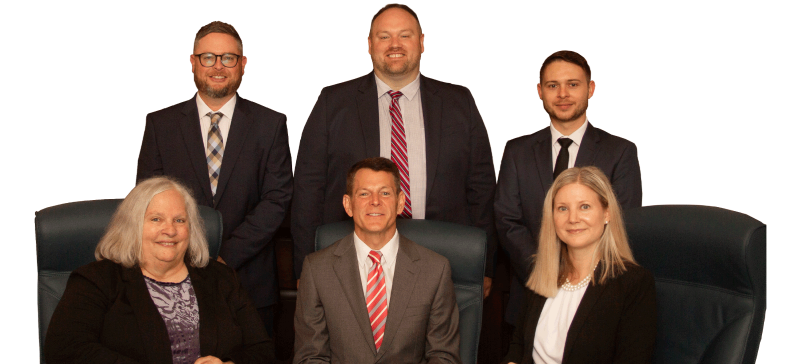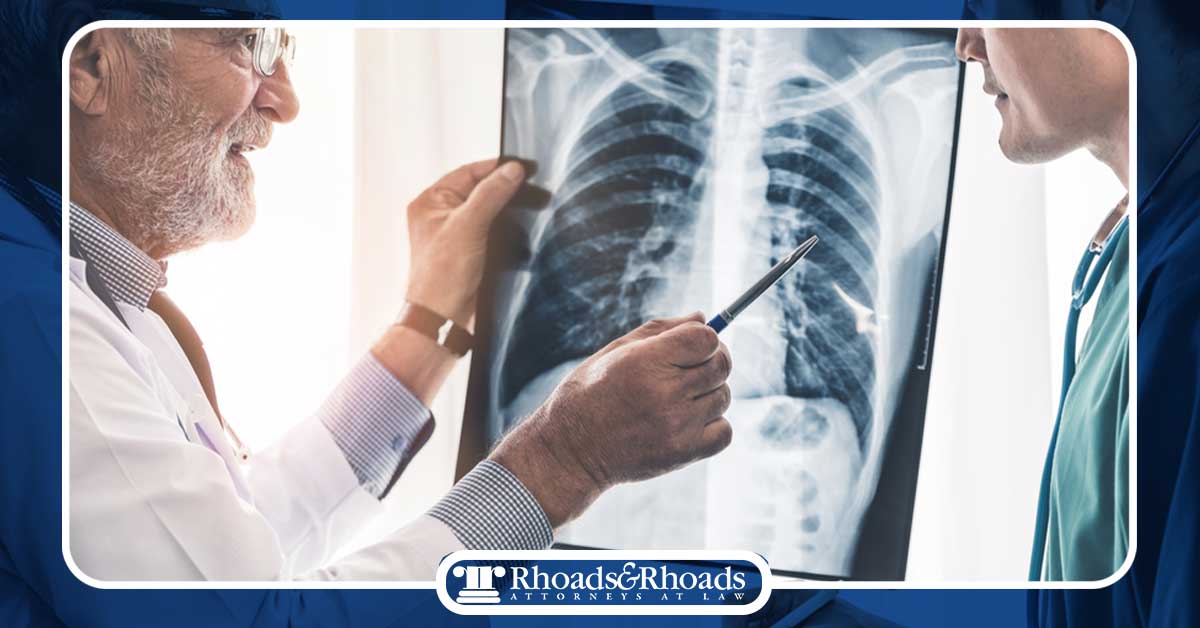
In the chaotic aftermath of a car accident, victims seldom realize they’ve suffered internal blunt force trauma and traumatic injuries. Only later does tenderness bloom across their ribcage or stabbing pangs erupt when inhaling. Why does such pain only emerge over hours or days? Understanding how delayed rib injuries occur and finding care before dire complications set in is vital.
Internal Injuries After a Car Accident
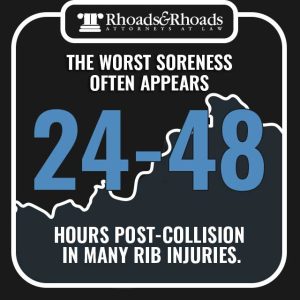
Whether from the force of rapid airbag deployment or torso impact against vehicle structures, blunt chest trauma commonly results. A fractured or broken rib ranks among the most frequent yet overlooked car accident injuries. Even bone bruising and strains of the muscles surrounding the rib cage take time to display symptoms.
The rib cage protects vital organs by enclosing the delicate lungs and heart structures. But minimal padding leaves ribcages vulnerable, as evidenced by over 58,000 annual emergency visits for chest pain, broken ribs, or rib injuries in two-vehicle crashes.
When inward pressure overpowers rib strength, fractures, and severe pain result. Jagged segments sometimes then scrape blood vessels or internal organs, possibly causing a ruptured spleen and internal bleeding. In serious flail chest cases with multiple adjoining rib breaks and significant chest trauma, chest cavity caving can obstruct breathing entirely.
Can Internal Injuries Be Delayed?
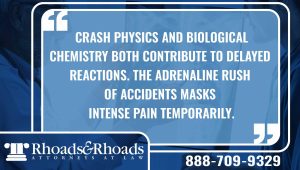
Yet crash physics and biological chemistry both contribute to delayed reactions. The adrenaline rush of accidents masks intense pain temporarily. Meanwhile, swelling and inflammation continue escalating internally over the ensuing hours and days. Both factors explain why the worst soreness often appears 24-48 hours post-collision in many rib injuries.
If you are in danger of any of these injuries, it is important to get to a hospital for medical assistance.
Recognizing Serious Rib Injuries After Car Accidents
Rib fractures rank among the trickiest accident wounds to detect minus imaging tests.
Some symptoms proving harder to ignore include:
- Sharp chest pain when breathing, coughing, or moving
- Visible chest bruising or abnormalities
- Shortness of breath, rapid heartbeat
- Fever indicates potential infection
- Blood-tinged mucus signals punctured organs or blood vessels
Less advanced rib cage strains still warrant attention. Discomfort when twisting, lung complications including reduced lung capacity, spasms, and nagging soreness suggest muscular, cartilage, or nerve damage. Lingering cases may spur anxiety, insomnia, and limited mobility concerns.
Common Rib Injuries from a Car Accident

Rib injuries are extremely common in car accidents due to the significant blunt force trauma that can occur when a victim’s chest and rib area slams into the steering wheel or dashboard. These rib injuries can range from minor bruising to having ribs break to a life threatening chest injury and punctured lungs.
Most rib injuries are fractured or broken ribs. This occurs when the blunt force of the accident is strong enough to actually crack or break one or more of the rib bones.
Symptoms include intense rib pain when breathing deeply or coughing, difficulty taking normal deep breaths, and pain in the rib area that gets worse with movement. When three or more ribs are broken, it often requires medical attention to ensure proper bone healing and prevent complications like a punctured lung.
Similar to a broken rib or fractured rib, another common type of serious injury is bruised or cracked ribs. While less severe than a full rib fracture, bruised ribs are still extremely painful, causing tenderness and discomfort in the days and weeks following an accident as the bone and surrounding muscles stretch and heal. Delayed pain often occurs as the initial adrenaline and shock wear off.
What Is a Flail Chest Injury?
A flail injury is an extremely serious rib injury involving multiple fractures in several adjacent ribs, causing a section of ribs to detach from the rest of the chest wall. This allows the chest wall to move in abnormal ways, causing significant pain and making it harder to breathe. As this can become life threatening, it is critical to seek medical attention.
Along with actual bone injuries, soft tissue injuries like strains of the intercostal muscles between the ribs are also frequent. Pain from muscle tears and intercostal strains can sometimes take days or weeks to fully develop. Seeking immediate medical attention is wise even for soft tissue injuries as pain relief, pain medication, and physical therapy can aid comfort and recovery from the significant injury.
In all rib injury cases, making regular follow-ups with your doctor and being aware of worsening symptoms or rib pain is important, as is understanding your legal rights if another driver caused your accident and injuries. An experienced personal injury attorney can provide helpful legal advice and make sure any available compensation properly accounts for pain, medical expenses, lost wages, and ongoing care related to your rib injuries or other chest injuries suffered in a car accident.
Why Seeking Prompt Treatment Matters for Pain After a Car Accident
Even tiny rib cracks carry risks if ignored after a car accident, especially for vulnerable groups like seniors. Simple fractures can trigger pneumonia when constant agony inhibits deep inhales. Flail sections or bone shards sometimes fatally pierce organs mid-recovery.
Meanwhile, surrounding tissue inflammation peaks at three days post-injury. Missing that optimal window for alignment and immobilization hampers bone knitting.
Seeking ER care or at least calling one’s doctor promptly after any substantial auto accident provides the greatest healing edge.
Managing Pain and Recovery From Rib Injuries
Once imaging scans determine the rib damage extent, medical treatment needs can be wide-ranged. Minor rib strains may require just oral pain relievers until tissues mend themselves. However, complex multi-fracture cases may call for hospitalization to stabilize chest architecture using tubes and ventilators.
Surgery only becomes necessary should bone position severely impede breathing or if fragments begin internally threatening vital organs.
Otherwise, the usual regimen involves:
- Prescription-strength analgesics to enable sleep and movement
- Ice packs/cold therapy easing muscular spasms and swelling
- Wrapping ribs to limit mobility and aggravation
- Gentle breathing exercises preventing lung infections
Complete rib fracture recovery can consume 6-8 weeks for single fractures and twice that for more involved injuries. Some permanent chest aches, stiffness, or shoulder pain may linger long-term even after apparently successful rehabilitation and returning the rib cage to its normal shape.
Pursuing Legal Accountability After Rib Injuries
Rib injuries may seem relatively minor at first. However, when injury occurs, it can lead to significant long-term issues or fatal complications if not properly treated. Chest infection, unhealed fractures affecting major blood vessels, and tearing of soft tissue connecting to the thoracic vertebrae are all potential complications.
In severe trauma cases, a flail chest injury can even be life-threatening if the broken rib segments begin to compress vital organs.
While pain medication and rest can alleviate discomfort initially for your pain after a car accident, seeking ongoing medical care is crucial. If you or a loved one suffered rib trauma in an auto collision, understand that symptoms like shortness of breath, worsening pain, chest spasms, and shoulder pain may indicate complications. Returning promptly to your normal active lifestyle requires ensuring your ribs heal properly in their normal protected shape around internal organs.
Rhoads & Rhoads | Car Accident Injury Lawyers
If another driver’s negligence caused your crash and rib damage, contact a dedicated personal injury attorney today. The Rhoads & Rhoads law firm has helped clients recover damages for medical costs, lost income, disability accommodations at work, and chronic health issues stemming from trauma injuries for over 20 years. Our personal focus and attention to each unique case has helped secure millions for injured victims statewide.
Call now for a free consultation at 888-709-9329. We can help you obtain compensation and long-term medical resources to facilitate full recovery of your rib injury.

